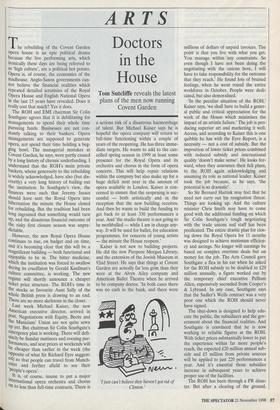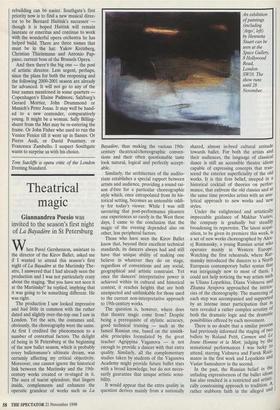ARTS
Doctors in the House
Tom Sutcliffe reveals the latest plans of the men now running Covent Garden The rebuilding of the Covent Garden opera house is an epic political drama because the live performing arts, which ironically these days are being referred to as 'high culture', are a political hot potato. Opera is, of course, the economics of the madhouse. Anglo-Saxon governments can- not believe the financial realities which repeated detailed scrutinies of the Royal Opera House and English National Opera in the last 15 years have revealed. Does it really cost that much? Yes it does.
The ROH and EMI chairman Sir Colin Southgate agrees that it is debilitating for managements to spend their whole time Pursuing funds. Businesses are not con- stantly talking to their bankers. Opera managements are supposed to generate opera, not spend their time holding a beg- ging bowl. The managerial mistakes at Covent Garden, he says, were partly caused by a long history of chronic underfunding. I understand that the ROH's main private backers, whose generosity to the rebuilding is widely acknowledged, have also (but dis- creetly) a very long history of bailing out the institution. In Southgate's view, the finances were such that Jeremy Isaacs should have sent the Royal Opera into hibernation the minute the House closed for rebuilding. But the tradition had been long ingrained that something would turn UP, and the disastrous financial outcome of the risky first closure season was unpre- dictable.
However, the new Royal Opera House continues to rise, on budget and on time, and it's becoming clear that this will be a Magnificent building — both functional and enjoyable to be in. The bitter medicine, which the institution was forced to swallow during its crucifixion by Gerald Kaufman's culture committee, is working. The new regime will shortly announce a cheaper ticket price structure. The ROH's time in the stocks as favourite Aunt Sally of the whole British press is drawing to an end. There are no more skeletons in the closet.
Last week Michael Kaiser, the new American executive director, arrived in Post. Negotiations with Equity, Bectu and the Musicians' Union are not quite sewn up yet. But chairman Sir Colin Southgate's emergency plan is working. There will defi- nitely be Sunday matinees and evening per- formances, and seat prices at weekends will be cheaper than earlier in the week (the ePPosite of what Sir Richard Eyre suggest- ed) so that people can travel from Manch- ester and further afield to see their People's opera'. It is, of course, insane to put a major international opera orchestra and chorus on to less than full-time contracts. There is a serious risk of a disastrous haemorrhage of talent. But Michael Kaiser says he is hopeful the opera company will return to full-time functioning within a couple of years of the reopening. He has three imme- diate targets. He wants to add to the can- celled spring season in 1999 at least some presence for the Royal Opera and its orchestra and chorus in the form of opera concerts. This will help repair relations within the company but also make up for a huge deficit next year in the amount of opera available in London. Kaiser is con- cerned to ensure that the reopening is suc- cessful — both artistically and in the reception that the new building receives. And then he wants to build the funding to get back to at least 330 performances a year. And 'the studio theatre is not going to be mothballed — while I am in charge any- way. It will be used for ballet, for education programmes, for concerts of young artists — the minute the House reopens.'
Kaiser is not new to building projects. He did the new Pierpont Morgan Library, and the extension of the Jewish Museum at 92nd Street. He says that things at Covent Garden are actually far less grim than they were at the Alvyn Ailey company and American Ballet Theatre when he arrived to be company doctor. 'In both cases there was no cash in the bank, and there were I just can't believe they haven't got rid of Clinton.' millions of dollars of unpaid invoices. The point is that you live with what you get. You manage within any constraints. So even though I have not been doing the negotiating with the unions here, I will have to take responsibility for the outcome that they reach.' He found lots of bruised feelings, when he went round the entire workforce in October. People were dedi- cated, but also demoralised.
'In the peculiar situation of the ROH,' Kaiser says, 'we shall have to build a gener- al public and critical appreciation for the work of the House which minimises the impact of an artistic failure.' The job is pro- ducing superior art and marketing it well. Access, and according to Kaiser this is one quibble he has with the Eyre Report, is a necessity — not a cost of subsidy. But the imposition of lower ticket prices combined with reduced subsidy and international quality 'doesn't make sense'. He looks for- ward, when they announce their full plans, to the ROH again acknowledging and assuming its role as national leader. Kaiser took the job because, as he says, 'the potential is so dramatic'.
So Sir Bernard Haitink may feel that he need not carry out his resignation threat. Things are looking up. And the culture minister Chris Smith may have to come good with the additional funding on which Sir Colin Southgate's tough negotiating with the trade unions and staff has been predicated. The entire drastic plan for clos- ing down the Royal Opera for 11 months was designed to achieve maximum efficien- cy and savings. No longer will earnings be based on complex overtime deals but on money for the job. The Arts Council gave Southgate a flea in his ear when he asked for the ROH subsidy to be doubled to £29 million annually, a figure worked out by the temporary chief executive Pelham Allen, expensively seconded from Cooper's & Lybrand. In any case, Southgate says that the Sadler's Wells contract was a very poor one which the ROH should never have signed.
The shut-down is designed to help edu- cate the public, the subsidisers and the gov- ernment about the financial realities. And Southgate is convinced that he is now working to reliable figures at the ROH. With ticket prices substantially lower to put the experience within far more people's reach, the expected £20 million annual sub- sidy and £5 million from private sources will be applied to just 220 performances a year. And it's essential those subsidies increase in subsequent years to achieve proper use of the facilities.
The ROH has been through a PR disas- ter. But after a clearing of the ground, rebuilding can be easier. Southgate's first priority now is to find a new musical direc- tor to be Bernard Haitink's successor though it is hoped Haitink will remain laureate or emeritus and continue to work with the wonderful opera orchestra he has helped build. There are three names that must be ip the hat: Yakov Kreizberg, Christian Thielemann and Antonio Pap- pano, current boss of the Brussels Opera.
And then there's the big one — the post of artistic director. Less urgent, perhaps, since the plans for both the reopening and the following 2000-2001 season are already far advanced. It will not go to any of the four names mentioned in some quarters Copenhagen's Elaine Padmore, Salzburg's Gerard Mortier, John Drummond or Munich's Peter Jonas. It may well be hand- ed to a new contender, comparatively young. It might be a woman. Sally Billing- shurst from the Met may be re-entering the frame. Or John Fisher who used to run the Venice Fenice till it went up in flames. Or Pierre Audi, or David Pountney, or Francesca Zambello. I suspect Southgate wants to surprise us with his choice.
Tom Sutcliffe is opera critic of the London Evening Standard.



















































































 Previous page
Previous page